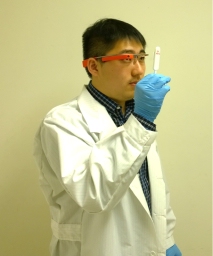With the new UCLA technology, Google Glass wearers can use the device’s hands-free camera to capture pictures of rapid diagnostic tests (RTDs), small strips on which blood or fluid samples are placed and which change color to indicate the presence of HIV, malaria, prostate cancer or other conditions. Without relying on any additional devices, users can upload these images to a UCLA-designed server platform and receive accurate analyses — far more detailed than with the human eye — in as little as eight seconds.
The new technology could enhance the tracking of dangerous diseases and improve public health monitoring and rapid responses in disaster-relief areas or quarantine zones where conventional medical tools are not available or feasible, the researchers said.
“This breakthrough technology takes advantage of gains in both immunochromatographic rapid diagnostic tests and wearable computers,” said principal investigator Aydogan Ozcan, the Chancellor’s Professor of Electrical Engineering and Bioengineering at UCLA and associate director of UCLA’s California NanoSystems Institute. “This smart app allows for real-time tracking of health conditions and could be quite valuable in epidemiology, mobile health and telemedicine.”
The research is published online in the peer-reviewed journal
ACS Nano.





